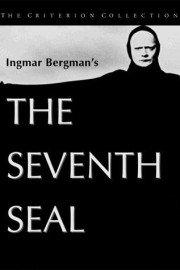The Seventh Seal
Was I really naïve enough to think that Ingmar Bergman’s most famous film, “The Seventh Seal,” was JUST about a knight from the Crusades playing chess with Death. Sadly, I must admit that yes, I did think this when I first saw it in 2001. At the time, I hadn’t seen much in the way of foreign films and world cinema, and I looked at “Seal” as a film I was “obligated” to see. I’m not sure whether my initial thoughts on the film were clouded by that, but being more familiar with Bergman’s work now, I felt that the time was right to revisit it.
What threw me most about the film that first time I watched it was the material involving a husband and wife traveling comedy troupe. They really didn’t seem to fit in the film for me the first time. Now, they feel more organic within the film, not because of any thematic reason, but because of the counterpoint they offer to the knight’s journey back from the Crusades, and the scenes of hopelessness Bergman shows us as the black death ravages the land. Their scenes are warm, engaging, and more full of hope than just about any Bergman has put on film (at least, in the films of his I’ve seen).
That doesn’t mean that the rest of the film is doom and gloom, however. Bergman is too gifted a filmmaker for that. Take the scenes of the knight (Max von Sydow) playing chess with Death. At first, the appearance of Death startles the knight, who traveling home with his squire. But watch the knight during their second session together, after his confession to Death in the church, and more importantly, after the knight and his squire have sat down to eat with the husband, wife, and their young son. The knight is at such peace with himself that the prospect of death doesn’t phase him. Of course, he was a knight in the Crusades, and as he tells Death upon their first meeting, “My body is afraid. I am not.” However, after hearing his confessional, it’s easy to doubt his readiness. Not when he continues his game, though. Whether he earns his life or not by winning becomes a moot point, but only because in the end, nobody can beat Death.
Although he had been making films for a decade before this one, it was in 1957 when Bergman blossomed into the great filmmaker he would remain for the rest of his life. In that year, not only did he release this film, but “Wild Strawberries,” the one that personally, is Bergman’s finest. In tone and setting, the films are very different, but they both focus on the same spiritual quest. It’s the same quest that Bergman explored in every film he ever made, which is, simply, man’s search for meaning in his life. As Bergman would show time and again, though, sometimes, we wouldn’t discover that meaning until we came to the end of our life. Hopefully, by the time he made his final film, “Sarabande,” in 2005, and passed away two years later, Bergman found his own answers. After all, for the last 50 years of his life, he had the courage to share his questions with the world.










